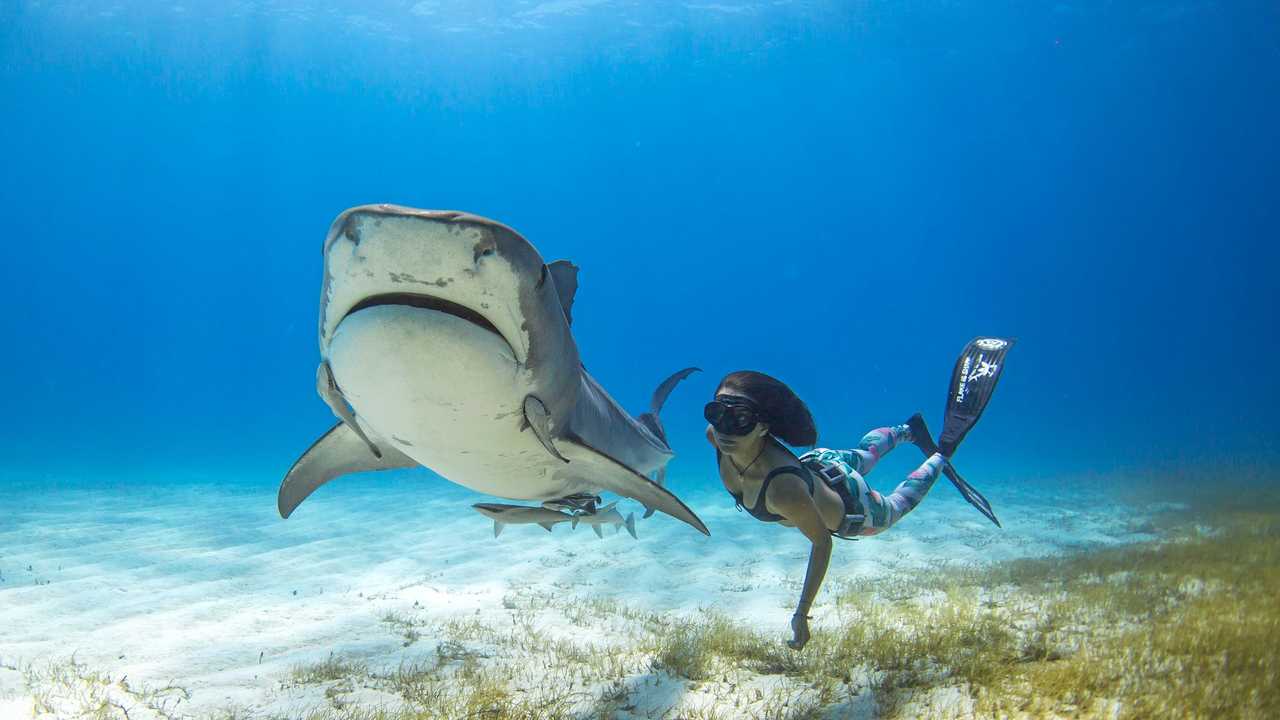What you really need to know about sharks
IT'S not a "popcorn movie", but the devastating and shocking footage in this documentary reveals an environmental catastrophe.

Opinion
Don't miss out on the headlines from Opinion. Followed categories will be added to My News.
THE world conservation message is loud and clear and yet it can sometimes fall silent amongst the plethora of media and entertainment that smothers us in perpetuity.
Eventually the most fundamental warnings just become another form of background noise.
But every so often one film, speech or message cuts through the mental smog loud and clear and eloquently highlights the pending global disaster that is becoming increasingly difficult to ignore - unless of course you stand to make money from environmental degradation.
The closing gala of the Byron Bay International Film Festival featured one such a film.
That movie was Sharkwater: Extinction and its international premiere took place at film festival's closing gala in Byron Bay.
It is not really a popcorn movie, such is the revulsion you will feel at the global greed blatantly robbing us of the top marine predator.
Governments appear to be happy to ignore the critical message being touted by those on the front lines of marine conservation.
Sharkwater: Extinction is the sequel to the highly acclaimed 2006 Canadian documentary Sharkwater by filmmaker Rob Stewart and it is devastating to watch - as much because Stewart tragically passed away during the making of the film as well as the shocking footage obtained by the film crew and Stewart.
The initial documentary resulted in bans and restrictions on shark fins in more than 90 countries and galvanized support for shark conservation after uncovering disturbing footage of the widespread trade of fins, including a roof covered in thousands of drying fins.
So why the need for a second documentary?
Despite a global rethink on sharks, human greed and ignorance has meant nothing has changed - in fact according to the film the corruption and criminal element that has moved in to exploit sharks has ramped up the environmental pressure on this dwindling species.
From West Africa, Spain, Panama, Costa Rica, France, and America, Stewart's third film dives into the often violent underworld of the pirate fishing trade to expose a multi-billion dollar industry.
One of the most poignant phrases in the film comes from Stewart himself: "450 million years of shark presence on Earth has been decimated in 30 years - their population decreased by 90 per cent."
What is so distressing about the two documentaries working in tandem is the realisation that as a species we have been unable to effectively deal with this issue.
Clearly the barbaric practice of slicing the fins off an animal and then letting it sink to the bottom of the ocean to drown is not a sustainable fishing practice.
So the arguments about utilising the world resources hardly even come into play.
But furthermore the fact that we are being fed shark without knowing it means we are unwilling participants as well.
But if we have not been able to deal with this issue in the last ten years does that mean we are sliding to our oblivion?
The shark issue is an integral link of a much bigger picture.
Ten years ago on TED Talks scientists were saying we had to act now to stop catastrophe.
Twelve years ago An Inconvenient Truth highlighted the pending disaster from climate change.
Seven years since Gasland showed us we could set our water on fire after mining practices.
Four years ago Cowspiracy highlighted the damage our farming practices were doing to the planet.
Just this year the IPCC report stated we have 12 years to limit a climate change catastrophe.
That is the same amount of time between the first Sharkwater and second Sharkwater documentaries.
Watching Sharkwater: Extinction one cant help but feel the reality of us sliding into catastrophic world of famine and extinction events is on the horizon and we are honestly not paying enough attention.
It makes we wonder what kind of documentary is needed, what dramatic shift has to happen before we stop being a frog in boiling water.
Rob manages to highlight, with stark clarity, the giant loophole which is being exploited by criminal elements.
It is not illegal to import the fins as a commodity.
You just need to transfer them from the fishing vessel to a shipping vessel.
Watching the headless bodies of blacktip reef sharks slapped on tables, viewers are also given a glimpse into the third world environment where shark fishing is seen as normal, common place and expected.
This gives way to heart-wrenching scenes in Florida Miami where Stewart interviews a man who makes his living from the recreational hunting of sharks.
His blonde hair, brazen accent, and polarised sunnies all adding to the grotesque spectacle of shark hunting.
Contrasted against Rob Stewart who is visibly pained by the action but stoically documenting the process with Byron Bay's resident 'Shark Girl' Madison Stewart in tow.
Madison is visibly upset after witnessing a hammerhead being hauled up on the boat, hooks in its flesh and blood leaking onto the boat floor.
The shark hunter, whose gratuitous self-importance is in strong contrast to Rob's focused conservation ethos, boasted that he had killed in excess of 50,000 sharks, and somewhere in the vicinity of up to 100,000 sharks.
It is incomprehensible that someone could feel no remorse at such widespread environmental destruction and who would then openly boast about it as an accomplishment of human resourcefulness.
Madison spoke at the film festival closing gala in Byron Bay of her deep respect for Rob after having worked so closely with him.
It was revealed at the Byron Bay Film Festival that the film had won the festival's Best Environmental Film Award.
The award in the future will be known as the Rob Stewart Environmental Film Award in his honour.
It is an honour that is truly befitting.
Whether it is brazenly walking into a shipping yard filming dead sharks being transferred to shipping vessels or being shot at as they dive to document drift nets in California, each moment is rigid with the dreadful realisation that there are people heavily invested in ensuring no one stands in the way of this environmental pillage.
Further footage shows 40,000 fins bagged up in a parking lot after being seized by government officials in Panama and left to rot.
Marine conservationists at the site note the fins come from juvenile hammerheads in the breeding ground which means the life cycle of the sharks were completely disrupted.
If you feel distant from this process you might want to check your makeup.
You may just be smearing the apex predator of the sea on your face or feeding it to your cat.
Collecting samples from food stores, Rob gets a university to analyse the samples for shark DNA.
And the results prove we are all complicit in this unfolding disaster.
All this terrible carnage is contrasted against some beautiful cinematography and underwater footage, especially when cameraman Brock Cahill helps to catch the expressive eyes of the rare Whitetip Sharks.
In the opening there is footage of Rob swimming in a bare ocean, and while it is beautiful it also perhaps a subconscious reminder of what the oceans will look like if we cannot move beyond our mindless consumption of fish and the oceans.
Rob's mission was to show how sharks are not the monsters we were led to believe in Hollywood films.
In fact, he showed how human beings left unchecked and ignorant can become the real monsters.



